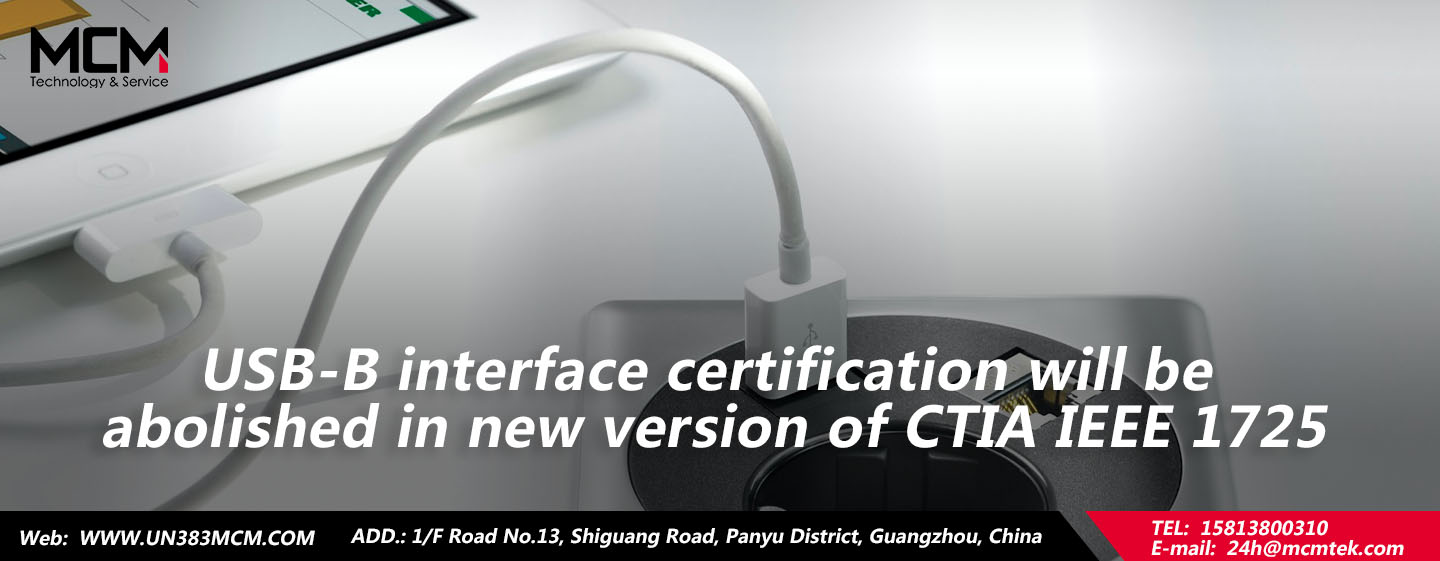USB-B interface certification will be abolished in new version of CTIA IEEE 1725

Introduction of CTIA
The Cellular Telecommunications Industry Association (CTIA) has a certification scheme covering cells, batteries, adapters and hosts and other products used in wireless communication products (such as cell phones, laptops). Among them, CTIA certification for cells is particularly stringent. Besides the test of general safety performance, CTIA also focuses on the structural design of cells, the key procedures of the production process and its quality control. Although CTIA certification is not mandatory, major telecom operators in North America require their suppliers’ products to pass CTIA certification, therefore CTIA certificate can also be considered as an entry requirement for the North American communications market.
Conference Background
CTIA’s certification standard has always referred to IEEE 1725 and IEEE 1625 published by IEEE (Institute of Electrical and Electronics Engineers). Previously, IEEE 1725 applied to batteries without a series structure; while IEEE 1625 applied to batteries with two or more series connections. As CTIA battery certificate program has been using IEEE 1725 as the reference standard, after the issuance of new version of IEEE 1725-2021 in 2021, CTIA has also formed a working group to initiate a program of updating CTIA certification scheme.
The working group extensively solicited opinions from laboratories, battery manufacturers, cell phone manufacturers, host manufacturers, adapter manufacturers, etc. In May of this year, the first meeting for CRD (Certification Requirements Document) draft was held. During the period, a special adapter group was set up to discuss the USB interface and other issues separately. After more than half a year, the last seminar was held this month. It confirms that the new certification plan of CTIA IEEE 1725 (CRD) will be issued in December, with a transition period of six months. This means that CTIA certification must be performed using the new version of the CRD document after June 2023. We, MCM, as a member of CTIA’s Test Laboratory (CATL), and CTIA’s Battery Working Group, proposed revisions to the new test plan and participated throughout the CTIA IEEE1725-2021 CRD discussions. The following are the important revisions:
Main Revisions
- Requirements for battery/pack subsystem was added, products need to meet standard either UL 2054 or UL 62133-2 or IEC 62133-2 (with US deviation). It is worth noting that previously there is no need to provide any documents for pack.
- For the cell test, IEEE 1725-2021 deleted the short-circuit test for the cell after 25 high and low temperature cycles. Although CTIA has always referred to the IEEE standard, it finally decided to retain this test. This is to consider that the test conditions are harsher, but for some aging, bad batteries, such test can detect the material performance immediately. It also shows the determination of CTIA to strictly control the safety of cells.
- The new CRD of CTIA IEEE 1725 removes related test items of USB Type B and also changes the test limit of overvoltage for host devices from 9V to 24V to comply with the USB Type C specification. This also signals that after the transition period ends next year, USB Type B adapters will no longer be able to apply for CTIA certification. This also caters to the industry, which is now mostly shifting USB Type B adapters to USB Type C adapters.
- The application scope of 1725 product is expanded. With the increase of cell phone battery capacity, the capacity of a single-cell battery can no longer meet the long-time use of cell phone. Therefore, IEEE 1725 compliance certification for cell phone battery certification also expands the range of cell configurations in the battery.
- Single cell (1S1P)
- Multiple parallel cells (1S nP)
- 2 series multi-parallel cells (2S nP)
All of the above can be certified under CTIA IEEE 1725, and other battery configurations should meet the requirements of CTIA IEEE 1625.
Summary
Compared with the old version, the new does not change too much in the test items, but the new version puts forward a number of new certification requirements, clarifying the scope of product certification, etc. And the adapter chapter was substantially modified. The purpose of the adapter certification is to verify the most commonly used interface types, and USB Type C is more in line with the mainstream applications. Based on this, CTIA uses USB Type C as the only adapter type. Currently the EU and South Korea have a draft to unify the USB interface, the decision CTIA made to abandon the USB Type B and move to USB Type C also lays the groundwork for a possible unified USB interface in North America in the future.
In addition, the above comments and revisions are the content agreed at the meeting, the final regulations should refer to the formal standard. Currently the new version of the standard has not been released yet and it is expected to be issued in mid-December.

Media Contact
Company Name: Guangzhou MCM Certification Testing Co.,Ltd.
Email: Send Email
Phone: 13622887960
Country: China
Website: https://www.un383mcm.com/

